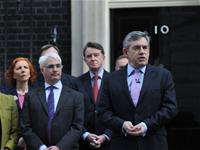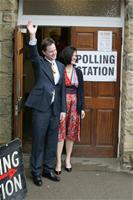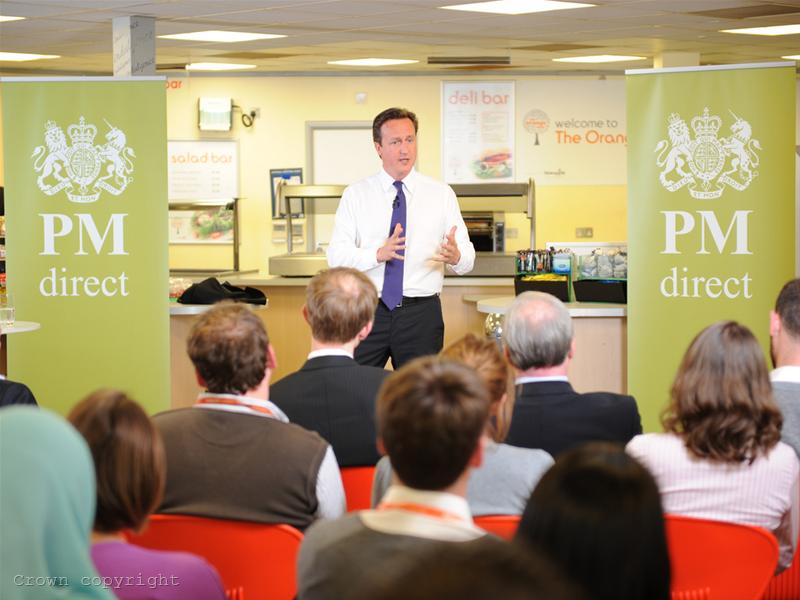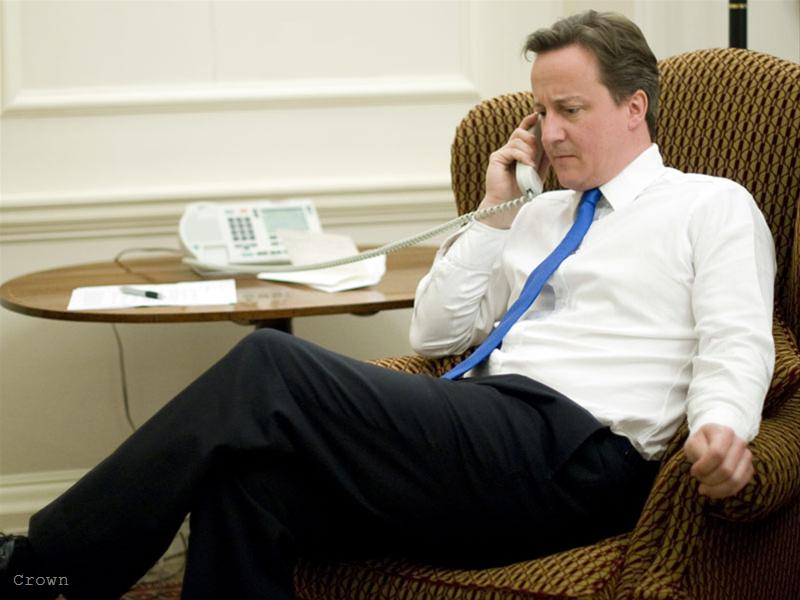Voters have voted, now politicians are to decide
Adelina Marini, May 10, 2010
 The Britons are scared - they are about to have a coalition government and this is something they would avoid. Why? Because, firstly, responsibility is being washed away with coalitions and, secondly, coalitions force participants to make compromises with the promises they made to attract voters. This is why now, although forecasts appeared quite precise, Nick Clegg's task (the libdems' leader) seems extremely hard. Since the end of election day (on Thursday) he is in constant negotiations either with the Conservatives which offered joint governance, or with his colleagues in the party.
The Britons are scared - they are about to have a coalition government and this is something they would avoid. Why? Because, firstly, responsibility is being washed away with coalitions and, secondly, coalitions force participants to make compromises with the promises they made to attract voters. This is why now, although forecasts appeared quite precise, Nick Clegg's task (the libdems' leader) seems extremely hard. Since the end of election day (on Thursday) he is in constant negotiations either with the Conservatives which offered joint governance, or with his colleagues in the party.
In the same time a small group (for the overall electoral landscape in Britain) protested all day long on Saturday in front of the building where Nick Clegg was discussing the future actions of his party. The protesters wanted political reform that would reflect fairly voters' will. The group, organised by Unlock Democracy managed to gather together around 1,000 people who filed a petition for the libdems.
After several hours of noisy chanting slogans at the small square in the centre of London, Nick Clegg appeared before the crowd to officially accept the petition stating the it was the reform of politics that made him enter politics in the first place. He also said he had campaigned for a fairer political system and that he truly believed that this was of national interest.
This year's election campaign in Britain raised a great lot of questions, to which we are also looking for answers, although in Bulgaria it seems we are only pretending to be looking for answers.
One of the serious issues, raised with the elections this year, was about the gap  between voters and elected. This was illustrated quite vividly by the following cases. The famous British traditions have been broken this year with the introduction of something which we indulge for a long time - TV debates. In the end of the first debate prime minister Gordon Brown (leader of the Labour party) apologized to the public, saying that they had to watch the boring debate instead of "Britain is looking for a talent" or the favourite series.
between voters and elected. This was illustrated quite vividly by the following cases. The famous British traditions have been broken this year with the introduction of something which we indulge for a long time - TV debates. In the end of the first debate prime minister Gordon Brown (leader of the Labour party) apologized to the public, saying that they had to watch the boring debate instead of "Britain is looking for a talent" or the favourite series.
This statement clearly shows that the prime minister, who was for 8 years before that a minister of finance of Tony Blair in two consecutive cabinets, is deeply aware of society's priorities. The question is therefore who whose attention should attract and how?
The second case that caused an enormous scandal was again with Gordon Brown starring. During a campaign meeting a woman, sympathizing the Labour, approached Mr Brown and started asking him about the immigrants from Eastern Europe - why were they allowed in such numbers and how the problem could be solved. Brown seemed for the cameras pretty concerned in responding to the woman's worries. Leaving the meeting, however, he forgot to take his microphone off which allowed the audience hear him rebuking his staff for allowing this woman approach him because this was a farce.
This unleashed great indignation and Brown had to apologize. But what is important here is that this incident raised another very important issue - how much time is needed for someone to "overeat" with power? Or, in other words - how much time is needed for the ruling majority to distance itself from its voters, if it ever was close to them? Currently Britons are debating on various ways of reforming their electoral system, some of which are performed for years in Bulgaria, the proportional vote for example.
Realising that they are the oldest parliamentary democracy in the world and also the most conservative society, the British often watched Europe during the campaign, relieving themselves that coalitions are not a problem on the continent. Coalitions have ruled European countries since World War II. But does this necessarily mean a good practice? No! And is a coalition just a technical alliance of the will of the most active voters and the parties they represent? Again no! Or at least it should not be that way.
 Another big problem is analyzing the election results. For example it is clear that the libdems lost more seats (currently they have 57) than they had in the previous House of Commons (62), but this does not necessarily mean that the reason is loss of confidence and popularity. It could be that people might have made a pragmatic choice. In numerous inquiries on TV, many people said they preferred Nick Clegg and his party but they wanted a strong government and that is why they gave their vote to one of the two biggest parties - Conservatives or Labour.
Another big problem is analyzing the election results. For example it is clear that the libdems lost more seats (currently they have 57) than they had in the previous House of Commons (62), but this does not necessarily mean that the reason is loss of confidence and popularity. It could be that people might have made a pragmatic choice. In numerous inquiries on TV, many people said they preferred Nick Clegg and his party but they wanted a strong government and that is why they gave their vote to one of the two biggest parties - Conservatives or Labour.
Quite often sociologists, politicians and even journalists are keen to count voters just as ballots, deprived of rational thought. And if something has to be changed it is not just the political or electoral system but the way social temperature is measured. The way the opinion of society is being registered. And this seems to be the bigger problem because if politicians do not know what is behind people's decision (vote) then they will be unable to undertake adequate actions, thus deepening the problem.
And here we come to another serious issue, discussed by many analysts in the UK - the role of PR. In other words - the attempt politics to be presented as a simple product, accompanied by relevant advertisement.
"Both are aware that in order to win the elections they have to stay aside from problems. Both are a product of media industry, whose only aim is to isolate society from the real function of election politics. It's purpose is to focus voters' attention not on the political programmes of a candidate but on his "personal qualities". Does he have leadership skills? Is he attractive as a person? Voters' thoughts must be busy with the image and the personality and not with a political platform".*
Who do you think this quote is written for? A correct answer would be as for Boyko Borissov (the Bulgarian prime minister) or for the Georgian president Mikheil Saak'ashvili or even for Gordon Brown. In fact this quote is from an essay of Noam Chomsky regarding the presidential elections in the US in 2004 when George W. Bush won a second term in the White House. Because we know very well even from our humble experience that the only responsibility of politicians is political, meaning - to lose or win elections. But as we know it is hard to build something for a single term but instead it could easily be destroyed.
So, another not quite popular mechanism remains - pressure from the bottom up. Or as Nick Clegg himself advised the protesters on Saturday - to continue to do what they did all day long - ask for new and different politics.
As for the unofficial results they are as follows: the Conservatives lead with 306  possible seats in the House of Commons, followed by Labour with 258 seats and the libdems with 57 MPs. For a strong majority 326 seats are needed, which means that a coalition between the tories of David Cameron and Nick Clegg is enough for a stable government.
possible seats in the House of Commons, followed by Labour with 258 seats and the libdems with 57 MPs. For a strong majority 326 seats are needed, which means that a coalition between the tories of David Cameron and Nick Clegg is enough for a stable government.
The current negotiations however are aimed to define such a cooperation - whether the libdems will participate in the cabinet with ministers or will only support the tories in Parliament on key legislation and in the rest of the time will work for themselves?
If the blue and yellow do not agree, Gordon Brown has already offered Nick Clegg talks. The results of the Labour however and those of the libdems require participation of a third and even a fourth party.
So, aside from seeing what will Queen Elisabeth II's government be, we have to find out how British voters would accept the news. And they seem to be concerned because participation in the vote is high - some 70% of all eligible to vote. And maybe it is not a bad idea whenever there is hesitation like this voters to be able to form a government through a referendum, instead of waiting for the results of secret meetings. But, again, this is a decision voters have to state on their own, without waiting someone else to take it on their behalf.
*Translation from the Bulgarian edition of the essay.
 | © Crown copyright
| © Crown copyright | © Crown
| © Crown | © ITV 1
| © ITV 1